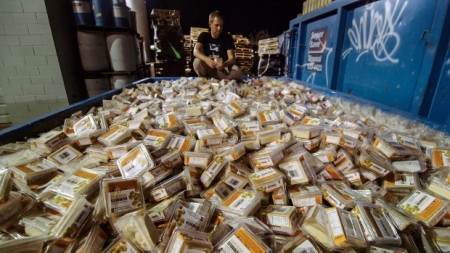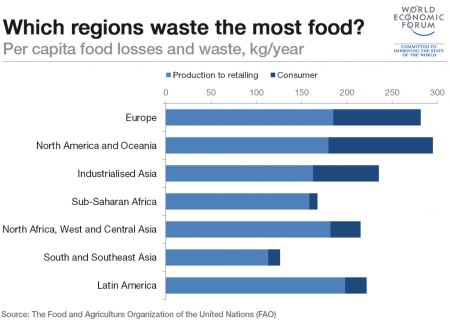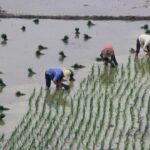December 20, 2015 – We humans waste 1.3 billion tons of food every year. The loss amounts to 2 to 3% of global gross domestic product (GDP). It happens on a planet where one in nine of us is malnourished. And it contributes 3.3 billion tons of greenhouse gases (GHGs) to the atmosphere every year. That makes food waste the third largest emitter of GHGs after China and the United States.
At a World Economic Forum meeting this past September in Dalian, China, Laura Nystrom, Professor, Department of Health, Science and Technology, Swiss Federal Institute of Technology, Zurich, spoke at length about the damaging impact of food waste. In her talk she focuses on the shelf life of foods we produce. So much of what is available today on grocery shelves becomes unusable because fresh produce can stay fresh for a very short period. Bread can only last a few days before it becomes stale. The result is a good percentage of the food we purchase to take home and consume finds its way into garbage or compost heaps rather than our stomachs. Nystrom’s mission is to find natural chemistry within plants that can be used to modify what we produce for consumption and by doing that extend shelf life and freshness for the food found on grocery store shelves. This would remove a good percentage of the 95 to 115 kilograms ( 210 to 254 pounds) an average North American and European throws away in food annually.
In a previous posting back in October of 2013 I wrote that we tie up 1.4 billion hectares (3.5 billion acres) of the world’s arable land producing food we never eat. And to produce this uneaten food we consume the equivalent to the annual flow of the Volga River, Europe’s longest, equal to 250 cubic kilometers of freshwater.
In terms of top wasters, the following graph shows per capita food losses and waste per year by global region.
Tackling the issue of wasted food to increase usable production would alleviate the hunger experienced today by the over 800 million suffering from chronic malnutrition. In fact, if we were to eliminate current food waste we can produce enough now to feed a planet with a population of 9 to 10 billion, the number that researchers predict we will reach by 2050. With food wastage at present levels, if we were to put more land into agricultural production, we would derive little benefit and contribute even more to GHGs and global warming.
So tackling food waste sounds like a good plan. Good for hungry mouths and good for reducing GHGs. Good for mitigating climate change. Where to start?
If we look at the entire food chain waste is everywhere. Whether it is found in what we eat or in the way we produce what we eat, the problem is rife throughout agriculture. If you look at what North America likes to consume, a lot of meat, we can see just how much of plant production gets fed to animals. Meat is truly the most intensive form of agriculture production. It consumes a significant amount of freshwater, land and energy and it contributes to diets in rich countries that exceed daily nutritional needs by 300 to 400%. It’s a hard habit to brake and today is producing a crisis of obesity in much of the Developed World. And what is even more unfortunate is that Developing World countries aspire to the meat habit as their economies grow.
So one way for us to reduce waste is to eat a diet that is rich and varied but not excessive. That means less meat. If we were to cut Developed World nutritional consumption by half, to 150 to 200% of daily needs, we would free up a lot of food and contribute to far less waste with associated GHGs. The health benefits of less meat consumption would be an added bonus.
So producing and eating less meat would be a good start, but waste is to be found at every stage in agriculture starting with farms. For example farmers throw away produce that may be imperfect because those who buy from them dictate this behavior. Then those perfect crops get imperfectly stored or transported contributing to more waste.
This is a particular problem in the Developing World where a lack of properly designed storage and a lack of refrigeration contributes to enormous losses. Add to this bad roads and the lack of a modern transportation fleet and production in these countries further contribute to food waste and not meeting the nutritional needs of local populations.
Then look at the supply chain of food handlers from buyers to exporters to importers and, finally, retailers. All those exchanges lead to more waste. All that transportation adds GHGs to the atmosphere. Those who do the calculations estimate losses from farmer’s field to the supermarket shelf amounts to 40% of what is produced. At the supermarket between 5 and 10% is further lost because what gets produced goes stale or rots before it can be purchased. And finally, at the consumption level, whether restaurants or households, 19% of the food we prepare gets tossed.
We cannot eliminate all waste in agribusiness but incremental improvements to the supply chain, and behavior change can reduce food waste dramatically. What the world cannot afford to do is put more land into cultivation by reducing natural forest lands, the worlds’ second largest carbon sink. All that will do is further contribute to GHG emissions. Deforestation will impact declining biodiversity, freshwater availability and in the case of the Amazon and Congo rainforests, impact weather on a global scale.
So tackling the way we do the business of producing and consuming food seems to be the best course of action. For the Developed World this means eating less and throwing away much less. For the Developing World this means tackling the supply chain issues that lead to a massive amount of food loss rather than cutting down more trees.
A global commitment from the world’s biggest food companies to reduce wastage by 50% across the entire supply chain by the year 2030 would be a good start and fit well with commitments by the world’s nations to reduce overall carbon emissions during the same period to combat global warming.











